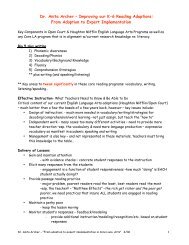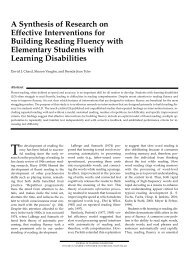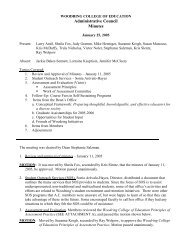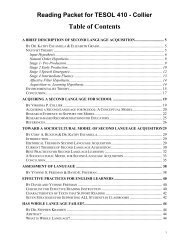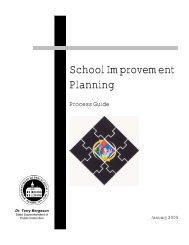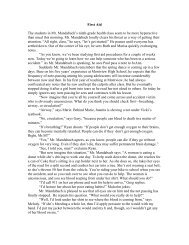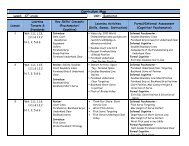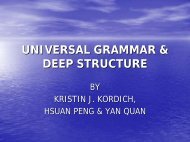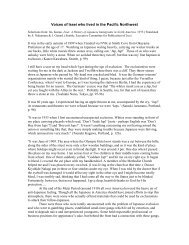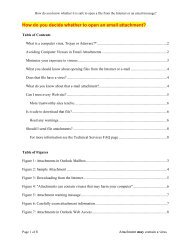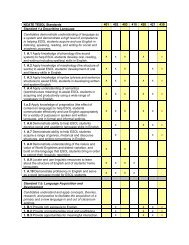<strong>of</strong> <strong>the</strong> most reliable measures <strong>of</strong> academic progress. While such tests, ei<strong>the</strong>r standardized orteacher-made, are clearly a type <strong>of</strong> language test, note that <strong>the</strong>y are related to normativeexpectations <strong>of</strong> <strong>the</strong> types <strong>of</strong> abilities, skills, and knowledge associated with placement on <strong>the</strong>academic scale from success to failure. As such, <strong>the</strong>y do not simply test knowledge <strong>of</strong> isolatedwords, but ra<strong>the</strong>r <strong>the</strong>y are indexical for a larger body <strong>of</strong> concepts, schemata, and cognitive skillsconsidered central to achievement in <strong>the</strong> educational enterprise as it is presently defined.ConclusionPerhaps, <strong>the</strong>n, an answer to our search for an adequate and appropriate measure <strong>of</strong> academiclanguage pr<strong>of</strong>iciency has already been found, and all we need to do is adopt some currently usedstandardized reading tests for use with LEP students. Such tests are highly integrative in natureand tap a large proportion <strong>of</strong> <strong>the</strong> skills which determine school achievement. While some suchsolution may, in fact, prove to be reasonable, it is not without some caveats and suggestions fornecessary supplementation. As I indicated at <strong>the</strong> beginning <strong>of</strong> this discussion, radical changes areneeded in testing procedures and interpretation. For example, Garcia (1987) has shown that LEPchildren may misinterpret English words or reading passages based on erroneous lexical orsemantic associations with <strong>the</strong>ir own language, or on different cultural schemata or personalexperiences. This research emphatically showed that scores by LEP students on such tests shouldnot betaken uncritically at face value, but that debriefing interviews afterward are essential tocheck on comprehension and reasons for responses. (This maybe an equally valid point fornative English speakers.) Secondly, we may look to <strong>the</strong> model <strong>of</strong> Special Education forassessment and placement procedures, since Federal law and many state plans require thatstudents from non-English language backgrounds must be assessed in <strong>the</strong>ir primary language aswell as in English before <strong>the</strong>y are placed into a special program. Despite all <strong>of</strong> <strong>the</strong> researchpointing to <strong>the</strong> importance <strong>of</strong> <strong>the</strong> native language in cognitive development, we have failed toinsist that where appropriate (e.g., not where native language loss has occurred or skills aremarginal) all LEP students should have a right to assessment in <strong>the</strong>ir native language as well asin English, and that placement judgments should not be based on English performance alone.Fur<strong>the</strong>r, tests <strong>of</strong> English language pr<strong>of</strong>iciency alone which are not based on or related to standardcurriculum content for native speakers should not be allowed to be used as <strong>the</strong> basis for academicplacement.© 2008 Dr. Ca<strong>the</strong>rine CollierAll Rights Reserved52
<strong>Art</strong>icle II.2 Cross-Cultural Communication: AnEssential Dimension <strong>of</strong> Effective EducationBy Orlando L. Taylor, Ph.D.Copyright © 1987 Revised and reprinted 1990.The Mid-Atlantic Equity Center - 5010Wisconsin Avenue, N.W., Suite 310 -Washington, D.C. 20016 - (202) 885-8517.<strong>In</strong>troductionEverything that occurs within a school, andespecially in <strong>the</strong> classroom, involvescommunication, <strong>the</strong> act <strong>of</strong> sharing information.Sometimes communication involves <strong>the</strong> use <strong>of</strong>oral or written verbal symbols. On o<strong>the</strong>roccasions, communication involves varioustypes <strong>of</strong> nonverbal symbols, including bodylanguage. Communication is <strong>the</strong> medium for instruction, assessment, interpersonal relationships,group interactions, parent and community relations and counseling. Most behavior problems inschools, and <strong>the</strong>ir resolutions, involve some type <strong>of</strong> communication. <strong>In</strong> sum, communicationperme<strong>ates</strong> education. Communication is culture bound. The way an individual communic<strong>ates</strong>eman<strong>ates</strong> from his or her culture. Of course, a person may know more than one culture or may becompetent in a combination <strong>of</strong> cultures. None<strong>the</strong>less, one basic truth prevails: communication isa product <strong>of</strong> culture. Students with different cultural norms are at risk if teachers have littleknowledge, sensitivity or appreciation <strong>of</strong> <strong>the</strong> diversity in communication styles. Such teachersmay perceive differences as problems and respond to students' diversify with negative attitudes,low expectations and culturally inappropriate teaching and assessment procedures. Culturallyand communicatively diverse students, in turn, may respond with low self concepts and lowacademic achievement to a school climate <strong>the</strong>y perceive as hostile. The result is reflected in <strong>the</strong>sestudents' excessive placements in special education, reduced placements in talented and giftedprograms and high suspension r<strong>ates</strong>.Cultural Diversity in AmericaThe Neglect <strong>of</strong> Cross Cultural Communication Issues in SchoolsSelf-Assessment on Communication and CultureTable I: What Do I Know About Culture, Communication and Language?Cultural Diversity in AmericaThe <strong>Un</strong><strong>ited</strong> <strong>Sta</strong>tes is currently experiencing radical demographic shifts which are changing <strong>the</strong>colors and <strong>the</strong> cultures <strong>of</strong> its citizenry. According to recent statistics, one American in fourcurrently defines himself or herself as non white. By <strong>the</strong> year 2010, because <strong>of</strong> higher birth r<strong>ates</strong>and immigration trends, non whites are expected to constitute more than one third <strong>of</strong> <strong>the</strong>© 2008 Dr. Ca<strong>the</strong>rine CollierAll Rights Reserved53
- Page 2 and 3: "Those who arrive by age 12 or 13 m
- Page 5: Article I.2 Are Signed Languages "R
- Page 8 and 9: Biological analyses of the status o
- Page 10 and 11: and beyond, speaking and signing ch
- Page 12 and 13: Conclusion: Are Signed Languages Re
- Page 14 and 15: Article I.3 The Interpreter: Has a
- Page 16 and 17: A few weeks earlier, I had called F
- Page 18 and 19: “We struggled even getting to the
- Page 20 and 21: herself by strapping a cassette rec
- Page 22 and 23: In 1998, after nine years as the ch
- Page 24 and 25: momentary burst of excitement that
- Page 26 and 27: can shape core grammar. Because the
- Page 28 and 29: The authors compared animal and hum
- Page 30 and 31: monkey moved. He followed it with h
- Page 32 and 33: delight, fear, laughter, and surpri
- Page 34 and 35: Piipaío in a hut: Pirahã huts typ
- Page 36 and 37: LEP students, and equitable organiz
- Page 38 and 39: 4. Second language development crea
- Page 41 and 42: curriculum or "teaching to the test
- Page 43 and 44: portfolio work was scanned and stor
- Page 45 and 46: experiences of many groups of stude
- Page 47 and 48: While not disagreeing that interpre
- Page 49 and 50: sound educational practice, however
- Page 51: arises from the efforts to abstract
- Page 55 and 56: males who can serve as positive rol
- Page 57 and 58: Understanding another culture is a
- Page 59 and 60: Pets and AnimalsWhich animals are v
- Page 61 and 62: to teach standard English is reflec
- Page 63 and 64: Asking personal questions of a pers
- Page 65 and 66: Using Cross Cultural Communication
- Page 67 and 68: Why Do Nonstandard English-Speaking
- Page 69 and 70: Before beginning to teach standard
- Page 71 and 72: • Negative attitudes toward low p
- Page 73 and 74: New standardized tests and assessme
- Page 75 and 76: Each of the behaviors listed above
- Page 77 and 78: Article II.3 Hard Work Hypothesis:
- Page 79 and 80: each point higher in SES, students
- Page 81 and 82: This case does not provide strong s
- Page 83 and 84: Article II.4 Language Acquisition a
- Page 85 and 86: 1992, p. XI). These researchers, wh
- Page 87 and 88: comprehend a word within a specific
- Page 89 and 90: more to the truthfulness of the chi
- Page 91 and 92: This idea of “semilingualism” c
- Page 93 and 94: Article III.1 A Brief Description o
- Page 95 and 96: take different lengths of time to c
- Page 97 and 98: example, should involve the same co
- Page 99 and 100: As with all stages of BICS acquisit
- Page 101 and 102: Assessment techniques at stage 3 ca
- Page 103 and 104:
different. Therefore, the social di
- Page 105:
integrative motivation. Basically,
- Page 109 and 110:
(Ellis, 1985; Hakuta, 1986). Howeve
- Page 111 and 112:
that sociocultural processes have o
- Page 113 and 114:
Article III.3 How Children Acquire
- Page 115 and 116:
phonetic units (unique to signed la
- Page 117 and 118:
Article III.4 Toward a Sociocultura
- Page 119 and 120:
emember is that the fundamental goa
- Page 121 and 122:
The best practices models can be th
- Page 123 and 124:
By focusing on the dialectic betwee
- Page 125 and 126:
intergenerational wisdom shared by
- Page 127 and 128:
Daily Realities RecappedThe above v
- Page 129 and 130:
traditions. At a time in our histor
- Page 131 and 132:
We will now look at two examples of
- Page 133 and 134:
Speakers communicate fluently, main
- Page 135 and 136:
question the effects of such attitu
- Page 137 and 138:
Article IV.3 Culture Change: Effect
- Page 139 and 140:
and psychological characteristics o
- Page 141 and 142:
Contraryto what wewere expecting, t
- Page 143 and 144:
Article V.1 Assessment in ESL & Bil
- Page 145 and 146:
vocabulary does the student lack?Is
- Page 147 and 148:
whether they are LEP and to provide
- Page 149 and 150:
Fourth, ESL and bilingual program s
- Page 151 and 152:
competent reader/writer. All versio
- Page 153 and 154:
Table 1Comparison of Recent Accultu
- Page 155 and 156:
unilinear model, which measures the
- Page 157 and 158:
an English-only instructional progr
- Page 159 and 160:
Article V.3 Assessment of English L
- Page 161 and 162:
8. Change answers only for a very g
- Page 163 and 164:
Riles, 1979; Jose P. v Ambac, 1983)
- Page 165 and 166:
proficiency is often underestimated
- Page 167 and 168:
Finally, when second language reade
- Page 169 and 170:
for their decisions, noting issues
- Page 171 and 172:
As mentioned above, when the transi
- Page 173 and 174:
ather than generic adjectives and t
- Page 175 and 176:
their imagined points of view. Ther
- Page 177 and 178:
English texts and demonstrate progr
- Page 179:
using inter-district teams). In the




